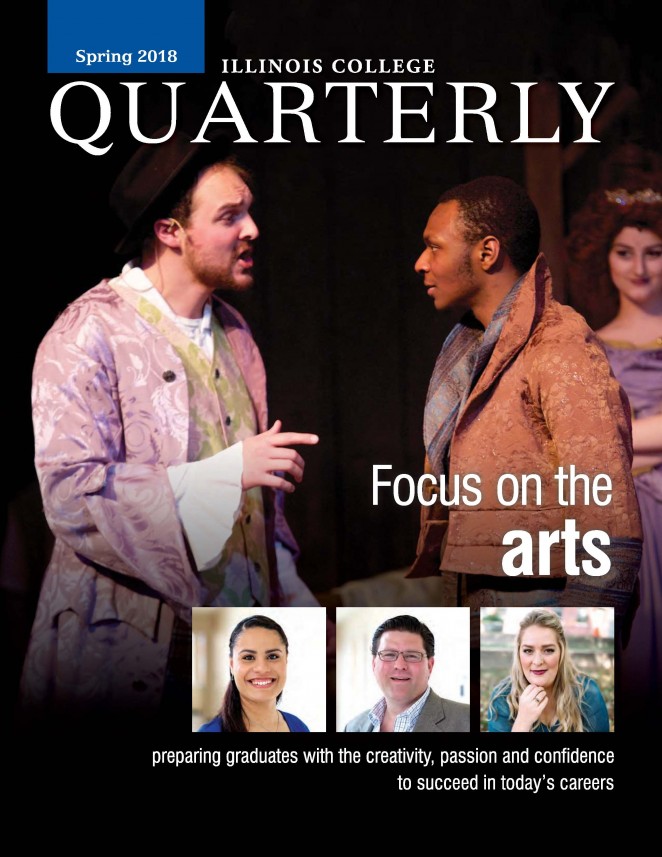Tanner and Dean talk arts

Tanner remains close to his IC advisor and mentor, Karen E. Dean, who interviews him below. Dean recently retired as professor of political science and has just started a new position at the College as graduate opportunities advisor.
DEAN: Hi, Ryan.
TANNER: Hi, Coach.
DEAN: I think this is going to be fun. This issue of the Quarterly has been devoted to the arts and since you left Illinois College, you have certainly been involved in a world you might not have imagined when you were a student.
TANNER: (laughing) Well, you told us all the time that a liberal arts education can prepare you for anything!
DEAN: That is true. … I remember in an earlier story — right after you and Jay won the Tony Award for the revival of “Pippin”— you were asked “just how did a political science major from Illinois College end up winning a Tony Award, Broadway’s highest honor?” Do you remember what you said?
TANNER: Are you kidding? Is this a test?
DEAN: It’s always a test, Ryan! You said you fell in love with theatre as a young man, but because you were afraid of performing, you got involved behind the scenes and well, that just led to your becoming a Broadway producer.
TANNER: Well, that’s true. Mostly. What’s wrong with that answer?
DEAN: You didn’t answer the question, Ryan! … You were asked how your majoring in political science could lead to Broadway. You didn’t talk about political science, mister! And you could have. So, let’s set the record straight now, shall we? Do you remember the course we had together in the fall of your senior year?
TANNER: Ahhhhhh. Now I see what you’re getting at. That was “Politics and the Arts,” wasn’t it?
DEAN: I loved teaching that class. I organized it around Herbert Marcuse’s idea “The Aesthetic Dimension.” He argued that the artist — the poet, the author, the composer, the painter, the playwright — was always a political actor, always offering us a view of the world that we needed to see, sometimes even an alternative world that offered more to us than did reality.
TANNER: Thinking that way, being a student of political science was a pretty good way to get ready to be part of Broadway. In fact, when we wrote the mission for Square 1, we actually reflected this idea. We said we want “to offer compelling, powerful entertainment … with thought-provoking works that inspire change.”
DEAN: Now you’re talking. So, what can you do with a political science major on Broadway?
TANNER: Inspire change!
DEAN: And you have! Let’s talk about “Come From Away,” OK?
TANNER: Absolutely. “Come From Away” is sometimes referred to as the 9/11 musical. It’s set in Gander, Newfoundland, and tells the stories of the thousands of people whose planes were diverted there when all the airports in the U.S. closed following the terrorist attacks. It also tells the stories of the residents of Gander and how they welcomed all those people despite their fears and inevitable culture clashes. In the middle of all that chaos, the people of Gander — long-timers and newcomers alike — found they needed each other. It was the only way to make some sense of the uncertainty the new post-9/11 world presented.
DEAN: I remember that there was some hesitation about how “Come From Away” would be received in New York City … that maybe it was too soon or too close to the principal site of 9/11.
TANNER: Yeah, that was a concern. We were thrilled that New York City audiences embraced it thoroughly.
DEAN: So did the critics! It won so many awards. I loved both the book and the music. In fact, I even shared one of its songs, “Prayer,” at my very last faculty meeting before I retired. Talk about inspirational! … Ryan, do you remember that the night of 9/11, we didn’t cancel our class. Everybody came over, all of us still trying to process what we had seen that day. We piled onto the couch and the floor watching the television coverage.
TANNER: No one wanted to be alone that night. We needed each other.
DEAN: Yep. Just like the folks in Gander. Funny, how life works out, isn’t it?


